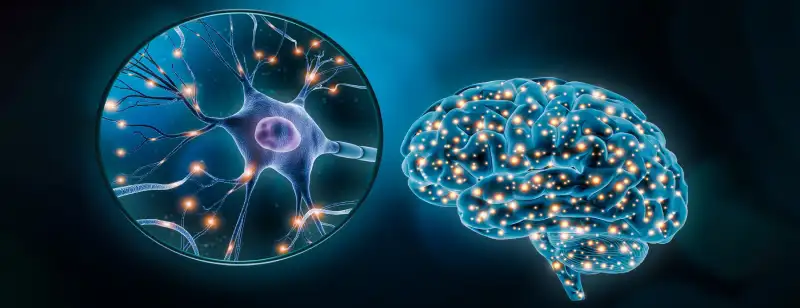Yes, neck pain can lead to brain fog due to cycling. You feel fuzzy-headed after long, brutal bouts of exercise since your brain has drained all its glycogen stores. Grab a snack and a recovery drink as soon as you can.
Incorrect posture while cycling, especially when the handlebars are positioned too low or too close to the rider, can cause the neck to stay awkward for long periods, leading to strain and tension in the neck muscles. This tension can affect blood flow and nerve function, causing brain fog.
A study of neck pain and brain fog in cyclists. We’ll also look at other factors contributing to brain fog and strategies to reduce these symptoms.
Can Neck Pain Cause Brain Fog Due to Cycling: 4 Key Facts

As a cyclist, it’s important to recognize factors contributing to brain fog during and after a ride. Neck pain, dehydration, poor nutrition, lack of sleep, and overtraining can impact clear thinking and performance. We’ll look at these factors and provide tips on how to mitigate them.
Dehydration
Dehydration is one of the primary contributors to brain fog among cyclists. Body fluid loss exceeds intake. Inadequate hydration can have various impacts on the body and mind, such as:
- Decreased blood volume, leading to reduced oxygen delivery to the brain.
- Reduced blood pressure, which can lead to lightheadedness and dizziness.
- Reduced brain activity, affecting attention, memory, and executive functions.
Some additional facts about dehydration and its effects on the body include:
- Mild dehydration can affect cognitive performance, such as attention, motor coordination, and memory.
- Losing just 2% of body water can decrease mental performance by up to 30%.
- Cyclists should drink at least 500 ml of water every hour of moderate-intensity cycling to replace fluid losses and maintain adequate hydration.
Poor nutrition
Poor nutrition is another aspect that can contribute to brain fog. A cyclist’s body needs adequate nutrients to function correctly, and a deficiency in any of them can result in physical and mental impairment. Deficits of specific nutrients that can lead to brain fog include:
- Vitamin B12: Vitamin B12 is essential for brain function and myelin formation, the protective coating around nerve fibers. Without enough vitamin B12, cognitive symptoms such as brain fog and confusion can occur.
- Iron: Transports oxygen throughout the body, including the brain. Oxygen deficiency can cause fatigue in the brain, resulting in fatigue and reduced mental performance.
- Omega-3 Fatty Acids: Omega-3s are crucial for brain function, and a deficiency in omega-3s can lead to mental sluggishness, depression, and anxiety.
Here are some additional facts and tips on nutrition and brain fog for cyclists:
- Protein is essential for muscle recovery, and a lack of protein intake can lead to fatigue and poor concentration.
- Cyclists should eat a balanced diet containing fruits, vegetables, whole grains, and lean protein sources.
- Trans fats, high sugars, and processed foods stimulate inflammation and affect brain function.
Lack of Sleep
Sleep is vital for mental and physical restoration, but cyclists often overlook it due to the numerous training demands. Sleep deprivation, including brain fog, can impair cognition and affect athletic performance. Here are some of the effects of sleep deprivation on the body and mind:
- Decreased mental alertness, cognition, and attention.
- It increased irritability, anxiety, and mood swings.
- Reduced reaction time and decision-making ability.
Tips for cyclists on sleep and brain fog include:
- Cyclists should sleep at least 7-9 hours every night for proper recovery.
- Napping can help boost cognitive function and reduce fatigue.
- Consistent sleep patterns, exposure to natural light, and limiting screen time before bed can promote better sleep quality.
Overtraining

Overtraining can negatively impact cyclists, including fatigue, injury, and decreased athletic performance. Overtraining can also result in brain fog and other cognitive symptoms due to the mental stress and fatigue it causes. Here are a few more tips and facts on overtraining and brain fog:
- Overtraining syndrome can decrease motor coordination, cognitive function, and attention.
- Cyclists should balance their training with adequate rest and recovery to avoid overtraining.
- Proper nutrition, hydration, and sleep are necessary to support training and avoid brain fog.
Neck pain and brain fog caused by cycling: Impact on Brain Function
We have far-reaching effects when we experience neck pain, even affecting our cognitive ability. Here are some of the impact of cycling on brain function and neck pain:
Restricted Blood Flow
When your neck muscles tighten because of cycling, they can restrict blood flow to your brain. This reduced blood flow means less oxygen and nutrients reach your brain cells, potentially leading to difficulties in thinking clearly and staying focused during your rides.
Brain Damage from Severe Injuries
In more severe cases resulting from cycling accidents, such as a broken neck, the impact on your brain can be significant. Damage to the neck can directly affect the brain, potentially causing lasting cognitive impairments that can hinder your cycling performance and overall well-being.
Brain Fog from Cycling-Related Neck Injuries
Experiencing a neck injury while cycling can often result in what’s commonly known as brain fog. This mental cloudiness can make it challenging to concentrate, remember things, or make quick decisions while you’re on your bike.
Pinched Nerves on Cycling Performance
A pinched nerve in your neck, aggravated by cycling posture or strain, can also contribute to brain fog. When a nerve in your neck is compressed or irritated, it can disrupt the signals traveling to and from your brain, affecting your ability to think clearly and respond swiftly to the demands of cycling.
Brain Fog Caused by Neck Pain: Connection
Neck pain and brain fog may seem like entirely different entities, but the two have a strong connection. Our discussion will focus on neck pain and brain fog and explore how these two conditions are related to cycling.
The Relationship Between the Neck and the Brain
Our necks are crucial in our bodies, mainly supporting the head’s weight. The seven vertebrae in the neck also help protect the spinal cord, which relays messages from the brain to the rest of the body.
When it comes to cycling, the neck plays an even more important role because it is constantly in motion, especially when the cyclist is in a bent-over position. This can strain and tighten neck muscles, causing neck pain.
Conversely, the brain controls and coordinates bodily functions like movement, sensation, and cognition. Our brains also control our emotions and behaviors.
Explanation of Brain Fog and Its Symptoms
Fog of the brain refers to a feeling of mental cloudiness or confusion. It is often accompanied by forgetfulness, difficulty concentrating, and feeling mentally drained. Other common symptoms of brain fog include:
- Fatigue.
- Headaches.
- Dizziness.
- Sleep disturbances.
The Neurological Implications of Neck Pain

Neck pain can have significant neurological implications, particularly regarding the function of the spine. Nerve stimulation is vital for the spinal cord, and any damage or disruption can result in neurological symptoms.
A neck injury can also result in tension headaches, which can hinder day-to-day activities. Chronic neck pain can also increase the risk of developing depression and anxiety, as the constant pain and discomfort can be emotionally draining.
Examples of Studies That Have Investigated Neck Pain and Brain Fog
Neck pain may be a contributing factor to brain fog in some individuals. A 2015 study published in the Journal of Manipulative and Physiological Therapeutics found that patients with neck pain also reported higher levels of cognitive dysfunction, including problems with concentration and memory.
Another paper published in Orthopaedic & Sports Physical Therapy in 2019 demonstrated that neck pain patients experienced increased levels of anxiety and depression. The study authors suggested that this may be due to the ongoing pain and discomfort associated with neck pain.
Conclusion
Neck pain and brain fog are common issues cyclists face. Neck pain can often lead to brain fog, making it difficult for cyclists to concentrate and perform daily tasks. Therefore, it’s crucial to understand the connection between brain fog and neck pain and take steps to reduce these symptoms.
Cyclists can reduce back pain and brain fog and improve their overall performance by ensuring proper bike fit and posture, stretching and strengthening exercises, and adequate hydration and nutrition.
With this information, cyclists can enjoy a safer, more comfortable, and enjoyable ride while minimizing the risk of neck pain. It’s time to prioritize your health and fitness, grab your bike, and hit the road confidently.
FAQs
Can Cracking Neck Cause Brain Damage?
You increase your risk of stroke by damaging these vessels by forcefully and constantly cracking your neck. Forceful cracking can also weaken your ligaments and tendons, affecting their ability to support your head for the rest of your life.
Is Neck Pain Related to Lack of Concentration?
Pain is not the only symptom of neck injuries, disorders, and conditions. Besides dizziness, they can also impair balance. Cervicogenic dizziness (or cervical vertigo) leads to the sensation that the world is spinning around an individual. Balance and concentration are also affected.
Brain Fog Caused By A Misaligned Neck?
The symptoms of cervical instability include blurry vision, changes in eyesight, tinnitus, vertigo, poor balance, brain fog, dystonia, tremors, decreased memory, swallowing difficulties, hearing impairments, and ear fullness.


